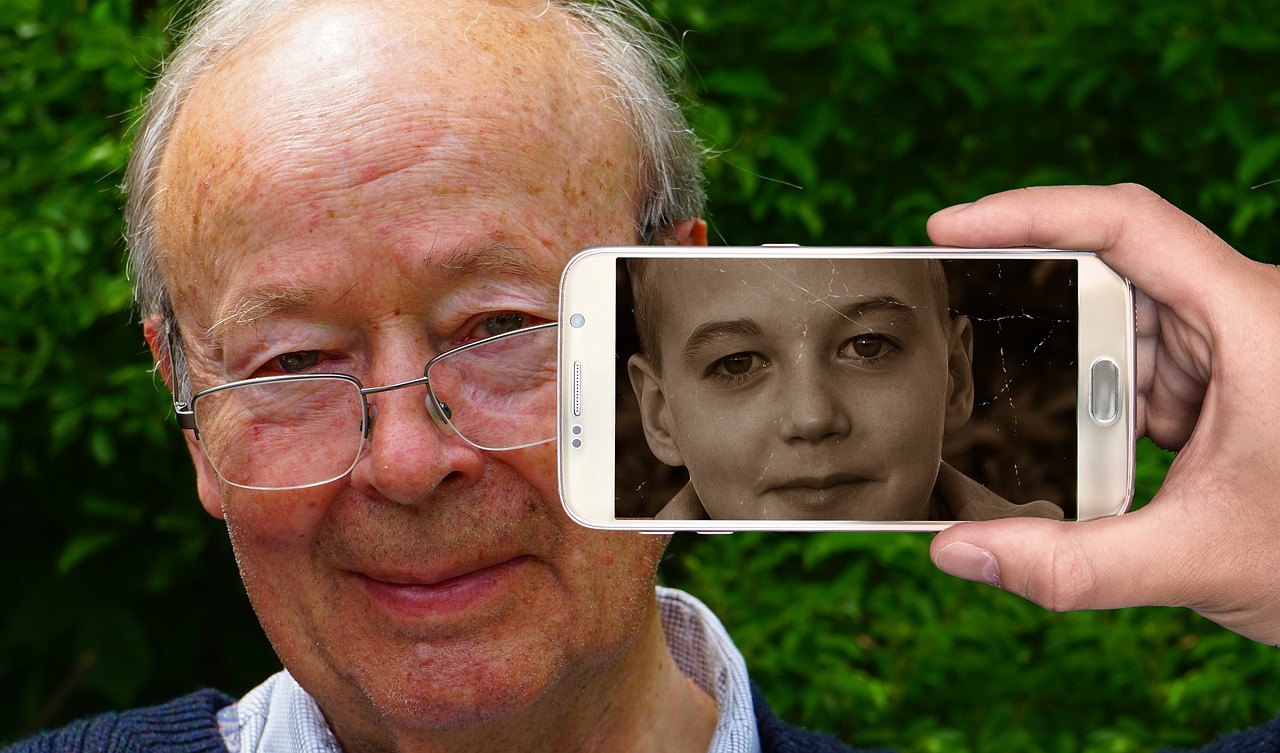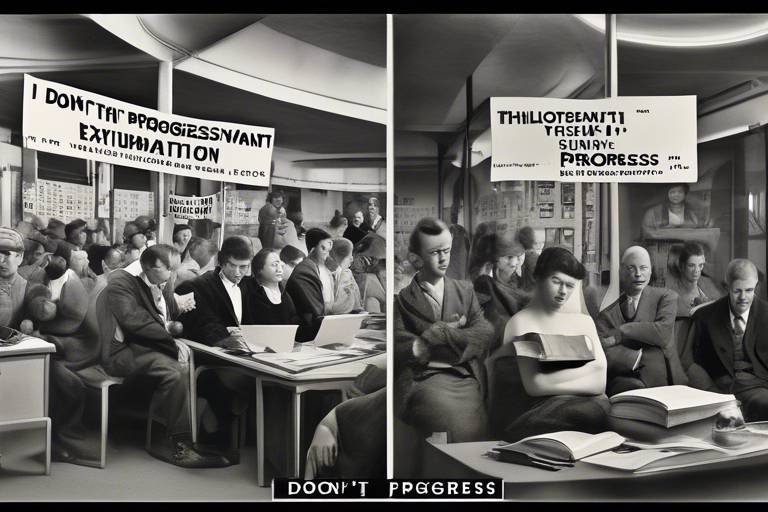The Intersection of Philosophy and Neuroscience
This article explores the dynamic relationship between philosophy and neuroscience, examining how each field informs the other and contributes to our understanding of the mind, consciousness, and human behavior.
Delving into the philosophical inquiries surrounding consciousness, this section discusses various theories and their implications for neuroscience, highlighting the ongoing debate about the subjective experience and its neurological underpinnings.
This section examines the philosophical implications of neuroscience findings on free will, discussing whether our choices are genuinely free or predetermined by biological processes, and how this affects moral responsibility.
Here, we analyze how neuroscientific studies challenge traditional notions of free will, presenting evidence that suggests our decisions may be influenced by unconscious processes before we are even aware of them. Imagine your brain as a complex orchestra, where each part plays its own tune, often without your conscious direction. This revelation raises profound questions: If our decisions are orchestrated by neural activity beyond our awareness, can we still claim ownership of our choices?
This subsection explores how the findings on free will impact ethical theories and moral responsibility, questioning whether individuals can be held accountable for actions determined by their neurological makeup. If our actions are merely the result of biological processes, does that absolve us of moral responsibility? This dilemma forces us to reevaluate our legal systems and societal norms, as we grapple with the idea of culpability in a world where our brains may be the true architects of our actions.
We discuss various philosophical arguments that defend the concept of free will despite neuroscientific challenges, including compatibilism and libertarianism, and how they reconcile with empirical evidence. Compatibilists argue that free will is compatible with determinism, suggesting that even if our choices are influenced by our biology, we can still act freely if we align our actions with our desires. On the other hand, libertarians insist on a more robust notion of free will, positing that individuals possess the power to make genuinely free choices that are not determined by prior states of the universe.
This part focuses on the historical development of the philosophy of mind and its relevance to contemporary neuroscience, exploring key theories such as dualism, physicalism, and functionalism. Dualism, famously advocated by René Descartes, posits a separation between mind and body, suggesting that mental phenomena are non-physical. In contrast, physicalism asserts that everything about the mind can be explained in terms of physical processes, a view that aligns closely with the findings of modern neuroscience. Functionalism, meanwhile, presents a middle ground, arguing that mental states are defined by their functional roles rather than their physical makeup.
This section addresses questions of personal identity through the lens of neuroscience, investigating how brain changes affect our sense of self and continuity over time, and the philosophical implications of these findings. If our identity is closely tied to our memories and experiences, what happens when those memories are altered or lost? This inquiry leads us to ponder the essence of who we are, challenging the notion that our identity is a static entity.
Here, we explore the role of memory in shaping personal identity, discussing how neuroscientific insights into memory formation and retrieval challenge traditional views on what constitutes the self. Consider the case of a person suffering from amnesia; without their memories, do they remain the same individual? Neuroscience reveals that our memories are not just passive recordings but dynamic constructs that can be reshaped, suggesting that our identity is more fluid than we often believe.
This subsection examines the ethical considerations arising from advancements in neuroscience, including issues related to brain enhancement, mental privacy, and the moral implications of neurotechnology on identity and agency. As we venture into the realm of enhancing cognitive abilities or altering memories through neurotechnology, we must confront ethical dilemmas: Should we enhance our brains to achieve greater intelligence? What happens to our sense of self if we can modify our memories at will? These questions highlight the urgent need for a robust ethical framework to guide our exploration of the mind.
- What is the main focus of the intersection between philosophy and neuroscience?
The main focus is to understand how philosophical inquiries about the mind, consciousness, and free will are informed by neuroscientific findings. - How do neuroscientific studies challenge the concept of free will?
Studies suggest that many of our decisions are influenced by unconscious processes, raising questions about the authenticity of our choices. - What ethical dilemmas arise from advancements in neuroscience?
Ethical dilemmas include issues of brain enhancement, mental privacy, and the implications of neurotechnology on personal identity and moral responsibility.

The Nature of Consciousness
When we dive into the mysterious waters of consciousness, we find ourselves faced with questions that have puzzled philosophers and scientists alike for centuries. What is consciousness? Is it merely a byproduct of brain activity, or does it hold a deeper significance? These inquiries are not just academic; they touch the very essence of what it means to be human. Imagine consciousness as a vast ocean, where each wave represents a thought, a feeling, or an experience. But beneath the surface, the currents of neuroscience are shaping what we understand about that ocean.
Philosophers like Descartes famously posited that "I think, therefore I am," suggesting a fundamental link between thought and existence. However, modern neuroscience challenges this notion by providing evidence that our thoughts may not be as autonomous as we believe. For instance, studies using brain imaging techniques reveal that certain brain activities precede conscious awareness of decisions, suggesting that our subconscious may be steering the ship long before we even realize it.
To further explore this intriguing intersection, we can consider various theories of consciousness that have emerged over time. Here are a few notable ones:
- Dualism: This theory, championed by Descartes, posits that the mind and body are distinct entities. It raises questions about how these two interact.
- Physicalism: Contrary to dualism, this view asserts that everything about the mind can be explained by physical processes in the brain.
- Functionalism: This theory suggests that mental states are defined by their functional roles rather than their internal constitution, focusing on how consciousness operates rather than what it is.
Each of these theories offers a unique lens through which we can examine consciousness, but they also highlight the complexities involved. Neuroscience provides valuable insights, yet it often leaves us with more questions than answers. For example, if consciousness arises from physical processes, what does that mean for our understanding of free will and personal identity? The ongoing debate between philosophers and neuroscientists reflects a broader struggle to reconcile subjective experience with objective measurement.
As we continue to peel back the layers of consciousness, we encounter the concept of the "hard problem" of consciousness, a term coined by philosopher David Chalmers. This problem addresses why and how physical processes in the brain give rise to the rich tapestry of subjective experiences. Why does the color red evoke a different feeling than the sound of a piano? This question underscores the limitations of neuroscience in fully capturing the essence of consciousness.
In conclusion, the nature of consciousness remains a profound mystery that invites both philosophical inquiry and scientific exploration. As we navigate this intricate landscape, we must recognize that each field offers valuable contributions to our understanding. Just as a painter uses different colors to create a masterpiece, the interplay between philosophy and neuroscience enriches our comprehension of the mind and consciousness. The journey may be fraught with uncertainty, but it is precisely this uncertainty that fuels our quest for knowledge.
- What is consciousness? Consciousness refers to the state of being aware of and able to think about one's own existence, thoughts, and surroundings.
- How does neuroscience study consciousness? Neuroscience employs techniques like brain imaging and electrophysiology to investigate the neural correlates of conscious experience.
- What are the main theories of consciousness? The main theories include dualism, physicalism, and functionalism, each offering different perspectives on the relationship between mind and body.
- What is the "hard problem" of consciousness? The "hard problem" refers to the difficulty of explaining why and how physical processes in the brain give rise to subjective experiences.

Free Will and Determinism
The age-old debate of free will versus determinism is like a fascinating game of chess, where every move can lead to unexpected outcomes. At its core, this discussion delves into whether our choices are truly ours to make or if they're merely the byproducts of biological processes and environmental influences. Imagine standing at a crossroads, feeling the weight of decisions on your shoulders, yet wondering if those paths were already paved long before you arrived. Neuroscience has stepped into this philosophical arena, challenging our understanding of human agency and moral responsibility.
Neuroscientific research suggests that many of our decisions may not be as conscious as we believe. Studies using brain imaging techniques have shown that our brains can initiate actions before we are consciously aware of them. This raises the question: if our brain is making decisions without our conscious input, can we genuinely claim to have free will? It's as if we’re actors in a play, with scripts written for us by our biology, and we’re just reading the lines without knowing the plot. This perspective can be unsettling, as it suggests that our sense of agency might be an illusion.
To illustrate this point, consider a fascinating study where participants were asked to make a decision about when to press a button. Brain scans revealed that the brain showed activity related to the decision up to 10 seconds before the participants were even aware of their choice. This discovery has profound implications for how we understand decision-making and the concept of free will. If our brains are wiring and firing in ways that lead to our actions before we consciously decide, it challenges the very foundation of what it means to choose freely.
Now, let’s talk about the ethical implications of these findings. If our actions are determined by neurological processes beyond our control, can we hold individuals morally accountable for their behavior? Imagine a world where someone commits a crime, and instead of punishment, they receive treatment for their neurological condition. This perspective can ignite heated debates in the fields of law and ethics, as it forces us to reconsider the principles of justice and accountability. Are we simply products of our biology, or do we possess the ability to transcend our neural programming?
Despite these neuroscientific challenges, many philosophers argue in favor of the concept of free will. Theories such as compatibilism suggest that free will and determinism can coexist. According to this view, even if our choices are influenced by biological and environmental factors, we can still be considered free as long as we act according to our desires and intentions. On the other hand, libertarianism posits that free will is incompatible with determinism, advocating for a more robust sense of agency that allows for genuine choice. This philosophical tug-of-war showcases the complexity of the issue, as thinkers strive to reconcile empirical evidence with our intuitive sense of freedom.
In summary, the interplay between neuroscience and the philosophical concepts of free will and determinism is a captivating exploration of what it means to be human. As we navigate through these profound questions, we must consider how our understanding of the brain shapes our views on morality, responsibility, and identity. It’s a journey that calls for open-mindedness and a willingness to challenge our deepest beliefs about ourselves.
- What is the difference between free will and determinism?
Free will refers to the ability to make choices independent of external influences, while determinism suggests that every event, including human actions, is determined by preceding events and natural laws. - Can neuroscience prove or disprove free will?
Neuroscience provides insights that challenge traditional notions of free will, but it does not definitively prove or disprove it. The debate continues among philosophers and scientists. - What are the implications of neuroscience on moral responsibility?
If our actions are influenced by neurological processes, it raises questions about accountability and whether individuals should be held responsible for their actions.

Neuroscientific Perspectives
The field of neuroscience has made significant strides in recent years, offering insights that challenge our traditional understanding of free will. Imagine standing at a crossroads, where one path leads to the belief that we are the architects of our own choices, while the other suggests that our decisions are merely the byproducts of unconscious processes. Neuroscientific research, particularly through the use of brain imaging technologies, has begun to illuminate this intersection, revealing that many of our decisions may be initiated in the brain long before we consciously recognize them.
One of the most striking studies conducted by researchers like Benjamin Libet in the 1980s demonstrated that brain activity associated with decision-making occurs several hundred milliseconds before individuals consciously report making a choice. This raises the tantalizing question: if our brains are firing off signals before we even think we've made a decision, are we truly in control? This phenomenon suggests that what we perceive as free will might be an illusion, a mere narrative our conscious minds create to make sense of our actions.
To delve deeper, consider the implications of these findings. Neuroscience posits that our choices are influenced by a myriad of factors, including genetics, environment, and even unconscious biases. For instance, studies have shown that emotional states can drastically alter decision-making processes, often leading to choices that contradict our rational intentions. This interplay between emotion and cognition complicates the notion of free will, as it implies that our decisions are not solely products of conscious deliberation but are also shaped by underlying neurological mechanisms.
Moreover, the exploration of brain regions involved in decision-making, such as the prefrontal cortex and the amygdala, offers a glimpse into how our neural architecture influences our behavior. The prefrontal cortex is often associated with higher-order thinking and self-control, while the amygdala plays a crucial role in processing emotions. When these areas interact, they can lead to decisions that reflect both rational thought and emotional impulse, further blurring the lines of autonomy.
As we consider the implications of these neuroscientific perspectives, it's essential to acknowledge the ongoing debate within the philosophical community. Some argue that if our decisions are predetermined by biological processes, it undermines the very foundation of moral responsibility. Others, however, suggest that understanding the brain's influence on our choices can lead to a more nuanced view of accountability. Perhaps, instead of viewing free will and determinism as opposing forces, we can see them as intertwined aspects of the human experience.
In summary, the neuroscientific perspective on free will invites us to reevaluate our understanding of autonomy and choice. As we continue to explore the complexities of the brain, we may find that the truth lies not in absolute freedom or complete determinism, but in a delicate balance between the two. The more we learn about the brain, the more we can appreciate the intricate dance between our conscious intentions and the unconscious processes that shape our lives.
- What is the main argument against free will based on neuroscience?
Neuroscience suggests that many decisions are made unconsciously before we are aware of them, challenging the notion that we have complete control over our choices.
- How does the brain influence decision-making?
Different brain regions, such as the prefrontal cortex and amygdala, interact to shape our decisions, often blending rational thought with emotional responses.
- Can we still hold people morally responsible for their actions?
This is a contentious issue. Some argue that understanding the brain's influence can lead to a more compassionate view of accountability, while others believe it undermines moral responsibility.

Implications for Ethics
The exploration of free will in the context of neuroscience brings forth a plethora of ethical considerations that challenge our traditional understanding of moral responsibility. If our actions are influenced, or even determined, by biological processes within our brains, then the very foundation of ethics—accountability—comes into question. How can we hold individuals responsible for their actions if those actions are the result of neurological impulses beyond their conscious control? This dilemma forces us to reconsider the implications of our ethical frameworks.
One significant area of concern is the potential for a shift in how we perceive criminal behavior. If neuroscience suggests that certain individuals may be predisposed to violent actions due to genetic or neurological factors, should we still punish them in the same way as those who are deemed fully responsible for their choices? This leads to a more rehabilitative approach rather than a purely punitive one, focusing on understanding the underlying causes of behavior rather than solely the actions themselves.
Moreover, the implications of neuroscience extend into the realm of moral philosophy. For instance, if our moral decisions are influenced by brain chemistry and structure, then what does that mean for the concept of moral agency? Are we merely products of our biology, or do we have the capacity to transcend our neurological predispositions? This conundrum raises profound questions about the nature of ethics itself, as we must navigate the murky waters between determinism and moral responsibility.
As we delve deeper into these issues, it becomes evident that a new ethical framework might be necessary—one that integrates insights from both neuroscience and philosophy. Here are some key considerations:
- Rehabilitation vs. Punishment: Shifting focus from punitive measures to rehabilitative approaches that address the root causes of behavior.
- Moral Agency: Reevaluating what it means to be a moral agent in light of neuroscientific discoveries.
- Ethical Responsibility: Developing a nuanced understanding of how to assign ethical responsibility when biological factors are at play.
In conclusion, the intersection of neuroscience and ethics is a rich field of inquiry that challenges us to rethink our assumptions about human behavior and moral responsibility. As we continue to uncover the complexities of the human brain, we must also be prepared to adapt our ethical frameworks to accommodate these new understandings. This ongoing dialogue between neuroscience and philosophy will not only enhance our grasp of human behavior but will also shape the future of ethical thought.
- What is the relationship between neuroscience and ethics?
Neuroscience provides insights into how biological processes influence behavior, prompting a reevaluation of traditional ethical frameworks that assume free will and moral responsibility. - How does neuroscience challenge the concept of free will?
Neuroscientific studies suggest that many of our decisions may be influenced by unconscious processes, raising questions about the extent of our control over our actions. - What implications does this have for criminal justice?
If behavior is influenced by neurological factors, there may be a shift from punitive measures to rehabilitative approaches that address underlying causes of criminal behavior.

Philosophical Responses
The debate surrounding free will in light of neuroscientific findings has sparked a rich tapestry of philosophical responses. Many philosophers refuse to concede that the discoveries of neuroscience completely undermine the concept of free will. Instead, they present various frameworks that seek to reconcile our understanding of free will with the empirical evidence provided by neuroscience. Among these responses, two prominent positions emerge: compatibilism and libertarianism.
Compatibilism argues that free will and determinism are not mutually exclusive. Compatibilists maintain that individuals can still be considered free in their choices, even if those choices are influenced by prior causes, including neurological processes. For instance, philosopher Daniel Dennett suggests that free will is not about being uncaused but rather about acting in accordance with one's desires and rational deliberation. In this view, as long as a person can reflect on their motivations and make decisions based on them, they possess a form of free will that is meaningful, despite the deterministic nature of the universe.
On the other hand, libertarianism posits that free will is incompatible with determinism and that individuals possess the ability to make genuine choices that are not predetermined by prior states of the world, including their biology. Libertarians argue that if neuroscience suggests that our decisions are influenced by unconscious processes, it raises questions about the authenticity of our choices. They assert that for moral responsibility to hold, individuals must have the capacity to have acted differently under identical circumstances. This perspective often invokes a more metaphysical view of the mind, suggesting that there is something inherently unique about human consciousness that allows for true agency.
Both compatibilism and libertarianism grapple with the implications of neuroscience on moral responsibility. If our actions are influenced by biological processes, can we truly hold individuals accountable for their decisions? Compatibilists argue that accountability remains intact as long as individuals act according to their desires and intentions. In contrast, libertarians contend that moral responsibility is compromised if our choices are merely the result of neurological events beyond our control.
Moreover, the discussion extends beyond just free will. Philosophers also consider the implications of neuroscience on our understanding of personal identity and the self. As we learn more about how brain changes can affect our sense of self, the question arises: if our identity is tied to our memories and cognitive processes, what happens when these are altered? This leads to a deeper inquiry into the nature of identity and the continuity of the self over time.
In summary, the philosophical responses to the challenges posed by neuroscience are varied and complex. While compatibilists and libertarians offer distinct frameworks for understanding free will, both perspectives contribute to a richer dialogue about the nature of human agency, moral responsibility, and identity. As neuroscience continues to evolve, so too will the philosophical inquiries that seek to make sense of our understanding of the mind and behavior.
- What is the main argument of compatibilism?
Compatibilism argues that free will and determinism can coexist, meaning that individuals can act freely even if their choices are influenced by prior causes. - How does libertarianism differ from compatibilism?
Libertarianism asserts that free will is incompatible with determinism and posits that individuals have the genuine capacity to make choices that are not predetermined. - What are the implications of neuroscience on moral responsibility?
The implications suggest that if our decisions are influenced by biological processes, it raises questions about our accountability for those decisions. - How does neuroscience affect our understanding of personal identity?
Neuroscience challenges traditional views of personal identity by showing that brain changes can alter our memories and sense of self over time.

Philosophy of Mind
The is a captivating field that delves deep into the nature of consciousness, the essence of the self, and the intricate relationship between the mind and the body. Over the centuries, philosophers have pondered fundamental questions: What is the mind? How does it interact with the physical body? Is our consciousness merely a byproduct of brain activity, or does it possess a unique, non-physical essence? These questions are not just academic; they resonate with our everyday experiences and shape our understanding of what it means to be human.
Historically, the philosophy of mind has been dominated by several key theories, each offering a different perspective on the relationship between mental states and physical processes. Here are some of the most influential theories:
- Dualism: This theory posits that the mind and body are distinct entities. René Descartes famously argued for this perspective, suggesting that the mind is a non-material substance that interacts with the physical body.
- Physicalism: In stark contrast, physicalism asserts that everything about the mind can be explained in terms of physical processes. According to this view, mental states are simply brain states, and consciousness emerges from complex neural interactions.
- Functionalism: This contemporary theory suggests that mental states are defined by their functional roles rather than their physical makeup. In other words, what matters is how a mental state operates within a system, much like how software functions on different hardware.
As neuroscience has advanced, it has provided empirical evidence that both challenges and enriches these philosophical theories. For instance, neuroimaging techniques allow scientists to observe brain activity associated with specific thoughts and emotions, lending support to the physicalist viewpoint. However, this raises further questions about the subjective experience of consciousness. Can we truly reduce the richness of our thoughts and feelings to mere neural firings? Or is there an irreducible quality to consciousness that remains elusive?
Moreover, the philosophy of mind is not just an abstract discussion; it has profound implications for fields such as psychology, artificial intelligence, and ethics. For instance, if we accept a physicalist view, then the development of AI might lead us to question whether machines can possess consciousness or a sense of self. Conversely, if dualism holds true, it might suggest that there are aspects of human experience that machines can never replicate.
In summary, the philosophy of mind serves as a bridge between ancient philosophical inquiries and modern scientific discoveries. It invites us to explore the depths of our own consciousness while challenging us to consider the implications of these explorations on our understanding of identity, agency, and morality. As we continue to unravel the mysteries of the mind, the dialogue between philosophy and neuroscience will undoubtedly deepen, offering new insights into what it truly means to be conscious.
- What is the main question in the philosophy of mind?
The primary question revolves around the nature of consciousness and its relationship to the physical brain. Philosophers seek to understand whether the mind is separate from the body or if it is entirely a product of physical processes. - How does neuroscience impact philosophical theories?
Neuroscience provides empirical evidence that can support or challenge philosophical theories about the mind. For example, findings about brain activity related to decision-making may influence our understanding of free will. - Can machines have consciousness?
This is a contentious issue in both philosophy and neuroscience. While some argue that consciousness is a product of biological processes, others believe that if machines can replicate certain functions of the mind, they may also achieve a form of consciousness.

Neuroscience and Personal Identity
The concept of personal identity is a fascinating and complex topic that intertwines the realms of neuroscience and philosophy. At its core, personal identity refers to the qualities and characteristics that make an individual distinct from others over time. But what happens when our brains undergo changes due to injury, illness, or aging? How do these alterations affect our sense of self? Neuroscience offers intriguing insights into these questions, revealing that our identity is not as fixed as we might believe. Instead, it is a dynamic construct influenced by our brain's structure and function.
One of the key areas where neuroscience intersects with personal identity is in the study of memory. Memory plays a crucial role in shaping who we are, allowing us to recall past experiences, learn from them, and form our future selves. However, neuroscientific research has shown that memory is not as reliable as we often assume. For instance, studies have demonstrated that memories can be altered or even fabricated, raising significant questions about the authenticity of our recollections. If our memories, which are integral to our identity, can be manipulated, what does that mean for our understanding of the self?
Furthermore, conditions such as amnesia and dementia illustrate how changes in brain function can lead to profound shifts in personal identity. Individuals with these conditions may struggle to recognize themselves or recall significant life events, prompting a reevaluation of what it means to be 'you.' This phenomenon challenges the notion of a stable, unchanging self and suggests that our identity may be more fluid than we previously thought. To explore this further, let’s consider some of the implications of neuroscience on personal identity:
- Brain Changes: Neuroplasticity—the brain's ability to reorganize itself—can lead to changes in personality and identity. When we learn new skills or adapt to new environments, our brain physically alters, which can influence how we see ourselves.
- Memory Formation: The process of encoding and retrieving memories is complex. Neuroscience shows that our memories are not perfect records but are instead reconstructed each time we recall them, which can lead to distortions.
- Identity and Continuity: Philosophical theories about personal identity emphasize the importance of psychological continuity. Neuroscience challenges this by showing how brain injuries can disrupt continuity, leading to questions about what truly constitutes the self.
As we delve deeper into the relationship between neuroscience and personal identity, we must also consider the ethical implications of these findings. For example, advancements in neurotechnology raise questions about mental privacy and the potential for manipulating memories or personalities. If we can alter brain functions, what does that mean for our autonomy and agency? Are we still the same person if our memories or cognitive abilities are changed? These ethical dilemmas highlight the necessity of a multidisciplinary approach, combining insights from neuroscience, philosophy, and ethics to navigate the complexities of identity in a rapidly evolving world.
In conclusion, the intersection of neuroscience and personal identity opens up a treasure trove of questions that challenge our traditional understandings of selfhood. As we continue to explore the brain's mysteries, we must remain open to the idea that our identity may not be a fixed entity but rather a tapestry woven from our experiences, memories, and biological processes. As we ponder these questions, we may find that the essence of who we are is not just in the memories we hold but in the very fabric of our neural connections.
- What is personal identity? Personal identity refers to the characteristics and qualities that define an individual and distinguish them from others over time.
- How does neuroscience impact our understanding of identity? Neuroscience reveals that our identity is influenced by brain function and structure, challenging the notion of a fixed self.
- Can memory changes affect personal identity? Yes, alterations in memory can lead to significant changes in how individuals perceive themselves and their continuity over time.
- What ethical considerations arise from neuroscience and identity? Ethical issues include mental privacy, the potential for memory manipulation, and the implications for personal autonomy.

Memory and Identity
Memory is often described as the bedrock of personal identity. It's fascinating how our recollections shape who we are, influencing our decisions, beliefs, and even our emotional responses. Imagine for a moment that your memory is like a grand library, filled with countless books that tell the story of your life. Each memory is a book, and together, they create the narrative that defines you. But what happens when those books start to fade or disappear? Neuroscience has provided us with profound insights into how memory works, revealing that our sense of self is not as stable as we might think.
Research in neuroscience suggests that memory is not a perfect recording of past events but rather a dynamic process that can be altered over time. When we recall a memory, we don't simply retrieve it; we reconstruct it. This reconstruction can be influenced by various factors, including current emotions, social context, and even the passage of time. For instance, have you ever recalled a childhood event and later realized that your memory of it was distorted? This phenomenon raises intriguing questions about the reliability of memory and its implications for identity.
Consider the following points regarding the relationship between memory and identity:
- Memory Formation: Memories are formed through complex neural processes involving encoding, storage, and retrieval. Different types of memory, such as episodic and semantic memory, contribute uniquely to our identity.
- Memory Loss: Conditions like Alzheimer's disease or amnesia can severely disrupt personal identity. When individuals lose their memories, they may struggle to recognize themselves or their loved ones, leading to an identity crisis.
- False Memories: The phenomenon of false memories, where individuals remember events that never occurred or recall them differently from how they happened, challenges the idea of a stable self. This raises questions about accountability and authenticity.
Neuroscientific studies have shown that the brain regions involved in memory, such as the hippocampus, play a crucial role in how we perceive ourselves over time. When we experience new events, our brain integrates these experiences with existing memories, continuously reshaping our identity. This fluidity can be both liberating and unsettling, as it suggests that our identity is not a fixed entity but a constantly evolving narrative.
Moreover, the implications of memory research extend beyond individual identity. They touch on broader societal concepts, such as collective memory. How do societies remember historical events, and how does this collective memory shape national identity? These questions highlight the intricate interplay between individual and collective experiences, suggesting that our identities are woven into the fabric of shared memories.
In conclusion, the relationship between memory and identity is a complex and evolving field of study. As neuroscience continues to unravel the mysteries of memory, our understanding of what it means to be human will undoubtedly deepen. The quest for self-knowledge is intertwined with our capacity to remember, and as we navigate the intricate pathways of our minds, we may find that our identity is as much about our memories as it is about our present experiences.
Q1: How does memory affect our identity?
A1: Memory plays a crucial role in shaping our identity by providing a narrative of our past experiences, influencing our beliefs, and guiding our future decisions.
Q2: What happens to our identity if we lose our memory?
A2: Losing memory can lead to a fragmented sense of self, as individuals may struggle to connect with their past and recognize their own identity.
Q3: Can memories be altered over time?
A3: Yes, memories can be reconstructed and altered by various factors, including emotions and new experiences, which can lead to distorted recollections.
Q4: What is the role of the hippocampus in memory?
A4: The hippocampus is a critical brain region involved in the formation and retrieval of memories, playing a key role in how we understand our identity over time.

Neuroethics
As we venture deeper into the realms of neuroscience, we find ourselves at the crossroads of ethics and technology, where the implications of our discoveries extend beyond the laboratory and into the very fabric of society. Neuroethics, a burgeoning field, grapples with the moral questions arising from advances in our understanding of the brain and its functions. What happens when we can enhance cognitive abilities? How do we navigate the murky waters of mental privacy? These questions are not just academic; they resonate with our daily lives and challenge our perceptions of identity and agency.
One of the primary concerns in neuroethics is the concept of brain enhancement. With the advent of technologies that can potentially augment our cognitive capabilities, we must ask ourselves: should we enhance our brains? The allure of becoming smarter, quicker, and more efficient is undeniably tempting. However, this raises ethical dilemmas regarding equity. If only a select few can afford such enhancements, does this create a new form of inequality? What about the pressure to enhance oneself in competitive environments? These questions highlight the need for a robust ethical framework that can guide the development and application of neurotechnologies.
Additionally, the notion of mental privacy is becoming increasingly significant in our neuroethical discussions. As neuroscience advances, our ability to access and interpret brain activity grows. Imagine a world where thoughts could be read or emotions predicted based on neural patterns. While this might sound like science fiction, it poses serious ethical concerns. Who owns our thoughts? How can we ensure that this information is not misused? The implications for personal privacy are profound, and we must consider how to protect individuals from potential violations of their mental sanctity.
Moreover, the moral implications of neurotechnology on identity and agency are critical. As neuroscience reveals more about how our brains function, it challenges traditional notions of personal responsibility. If our thoughts and actions can be traced back to neural processes, can we still hold individuals accountable for their actions? This question is particularly relevant in criminal justice, where understanding the brain's role in behavior could influence legal outcomes. The intersection of neuroscience and law is ripe for exploration, and it necessitates a careful consideration of how we define guilt and innocence in light of our biological makeup.
To illustrate the complexity of these issues, consider the following table that outlines some of the key ethical concerns in neuroethics:
| Ethical Concern | Description |
|---|---|
| Brain Enhancement | The ethical implications of augmenting cognitive abilities, including issues of equity and societal pressure. |
| Mental Privacy | Concerns about the ownership of thoughts and the potential for misuse of brain data. |
| Accountability | The challenge of determining moral responsibility in light of neuroscientific findings. |
As we navigate these uncharted territories, it becomes increasingly clear that neuroethics is not just an academic exercise; it is a vital discourse that impacts our lives. The decisions we make today regarding neurotechnology will shape the future of our society. Thus, engaging in these discussions is not just beneficial but essential for ensuring that advancements in neuroscience serve humanity positively and equitably.
- What is neuroethics? Neuroethics is the study of the ethical, legal, and social implications of neuroscience.
- Why is mental privacy important? Mental privacy is crucial to protect individuals from potential misuse of their thoughts and brain data.
- How does brain enhancement affect society? Brain enhancement raises concerns about equity, social pressure, and the definition of what it means to be human.
Frequently Asked Questions
- What is the relationship between philosophy and neuroscience?
Philosophy and neuroscience intersect in fascinating ways, with each discipline offering insights that can deepen our understanding of the mind and consciousness. Philosophy raises critical questions about the nature of existence and thought, while neuroscience provides empirical data about how the brain functions. Together, they create a rich dialogue that helps us explore complex topics like consciousness and human behavior.
- How does neuroscience inform our understanding of consciousness?
Neuroscience sheds light on consciousness by examining the brain's activity and its correlation with subjective experiences. Various theories in philosophy, such as dualism and physicalism, attempt to explain consciousness, but neuroscience provides the biological basis that can either support or challenge these theories. This interplay raises intriguing questions about what it means to be conscious and how our experiences are rooted in neurological processes.
- Can neuroscience prove or disprove free will?
The debate over free will is complex, with neuroscience suggesting that many of our decisions may be influenced by unconscious processes. Some studies indicate that our brains may initiate actions before we consciously decide to act. However, this doesn't outright disprove free will; instead, it invites us to reconsider what we mean by "choice" and how much control we truly have over our actions.
- What are the ethical implications of neuroscience findings?
Neuroscience raises important ethical questions, particularly regarding moral responsibility. If our choices are influenced by biological factors, can we hold individuals accountable for their actions? This dilemma challenges traditional ethical theories and prompts discussions about how we view punishment, rehabilitation, and moral agency in light of our neurological makeup.
- How does memory affect personal identity?
Memory plays a crucial role in shaping our sense of self and continuity over time. Neuroscientific research indicates that our memories are not static; they can change and evolve. This raises philosophical questions about what constitutes personal identity—if our memories can shift, how do we remain the same person throughout our lives?
- What is neuroethics?
Neuroethics is a field that examines the ethical implications of advancements in neuroscience. It addresses issues such as brain enhancement, mental privacy, and the moral consequences of neurotechnology on identity and agency. As we gain more control over our brains and behaviors, understanding the ethical landscape becomes increasingly important.



















